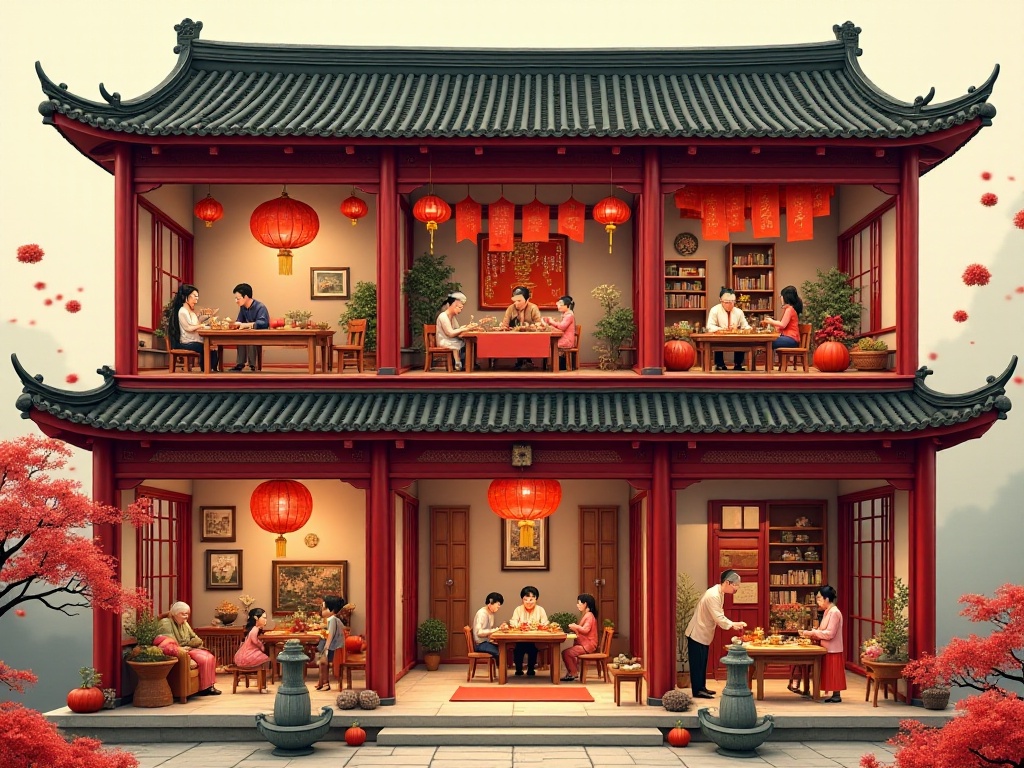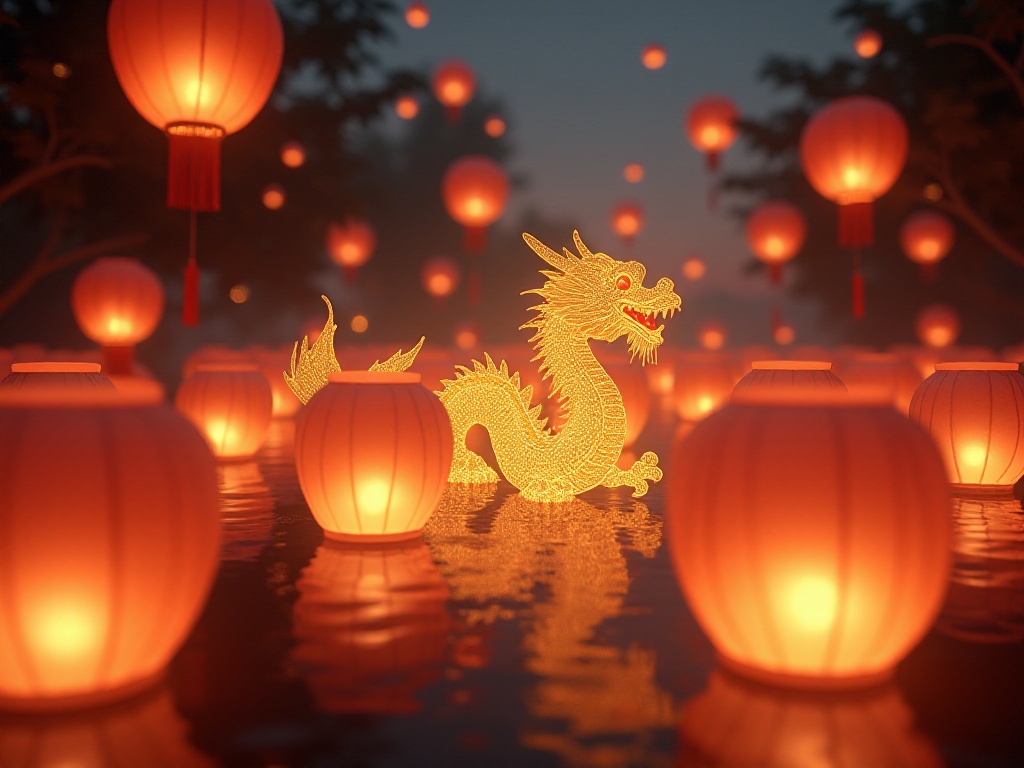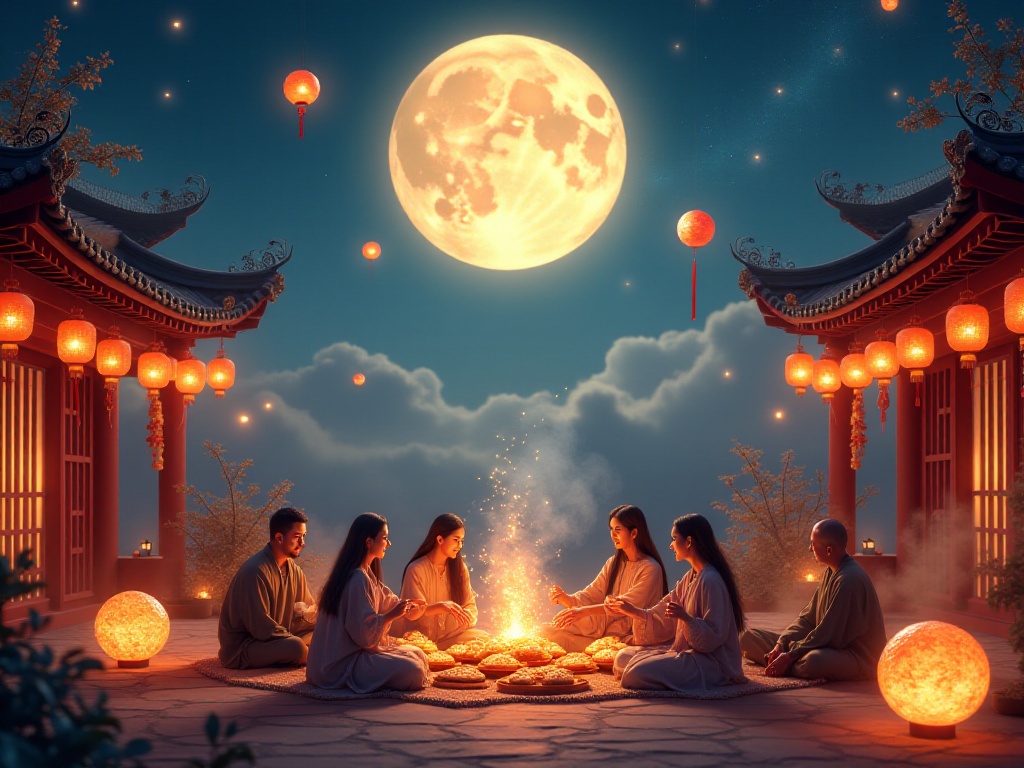Preface
To be honest, this trip home for Chinese New Year really gave me a lot of feelings. As someone born after 1995, I'm usually too busy with work to think about traditional culture. But this time, when I joined the elders in preparing New Year goods, making dumplings, and putting up spring couplets, I suddenly discovered how many interesting stories are hidden in our traditional festivals.
When I used to work in big cities, New Year seemed to just be about taking time off, resting, and going out to play - something felt missing. This time, returning to my hometown in Northeast China, seeing the red lanterns swaying in the courtyard, hearing neighbors visiting each other, and smelling the dumplings wafting from the kitchen, I finally understood what New Year should really be like.
Busy New Year's Eve
On the morning of the 29th day of the last lunar month, my mom eagerly dug me out of my bed. Half-asleep, I asked, "Mom, why are you waking me up so early?" She smiled and said, "Today is the big cleaning day, get up quickly and help."
In Northeast China, the big cleaning on the 29th is extremely important. It's not just simply sweeping the floor and wiping tables. My grandmother told me this custom can be traced back to the Shang Dynasty. Back then, people would worship their ancestors on this day, clean their houses, and welcome the new year.
My mom and I first wiped all the windows in the house, not missing even the hard-to-reach corners. Then we moved all the furniture out and thoroughly mopped the floor. My dad was responsible for cleaning the courtyard, clearing out all the accumulated junk from last year. Grandma was busy in the kitchen, washing all the pots, bowls, and utensils.
During the cleaning, I found many childhood toys and photos, each bringing back loads of memories. When grandma saw me finding my childhood photos, she started telling me stories from the past. In her era, the big cleaning was even more particular - they would even repaint the walls.
After being busy all day, by evening the whole house was renewed. Grandma said, "Cleaning the house thoroughly is about clearing away all the bad luck from the past year to welcome the new year." After hearing this, I finally understood why the elders place so much importance on this custom.

The Secret of New Year's Eve Dinner
Speaking of New Year's Eve dinner, it's truly the most important meal of the year. In our family, preparation for the New Year's Eve dinner starts from the 28th day of the last lunar month.
My mom and grandmother discussed the menu for New Year's Eve dinner, preparing eight cold dishes alone, and more than ten hot dishes. People in Northeast China emphasize having a "complete feast" for New Year, preparing abundant portions of each dish, worried there won't be enough if guests come.
The most important thing is making dumplings. I've always been curious why we must eat dumplings during New Year, so I specially asked grandma this time. It turns out dumplings are shaped like ancient Chinese silver ingots, symbolizing prosperity in the new year. Also, the Chinese word for dumplings sounds like "exchange of the old and new year."
The process of making dumplings is quite interesting. My grandmother and mom were busy at the cutting board while I helped on the side. Grandma's dumpling-making technique was especially skillful, making perfect dumplings in no time. It took me a long time to learn how to make one that didn't leak filling.
Grandma told me that in the past, during New Year dumpling-making, elders would wrap a coin in one of the dumplings. Whoever got this "lucky dumpling" would have good luck in the coming year. However, for safety reasons, our family now makes sweet dumplings instead. Getting a sweet dumpling is also considered a good sign.
While making dumplings, my grandmother specially taught me how to make beautiful pleats. She said, "You must put your heart into making dumplings, each pleat should be even, that's how they look good when cooked." I realized then that even small things like making dumplings contain life lessons.
During New Year's Eve dinner, the whole family sat together, with the Spring Festival Gala on TV and fragrant dishes covering the table. Seeing the smiles on my family members' faces, I suddenly felt this was when the New Year atmosphere was strongest.
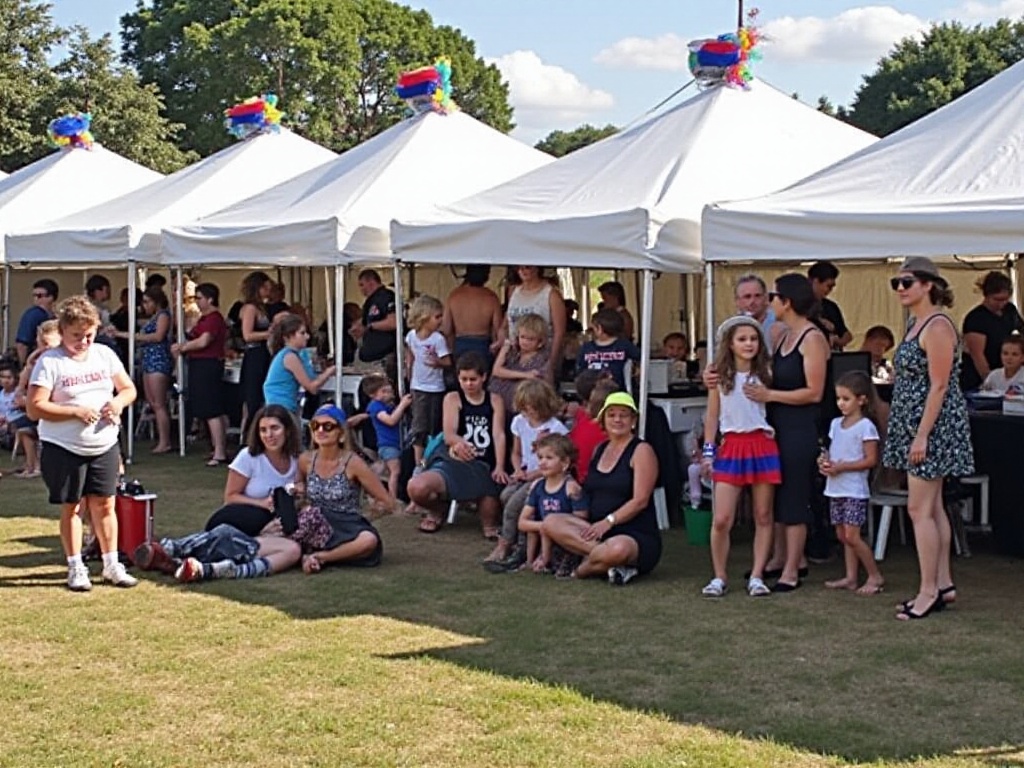
Celebrating the Lantern Festival
Right after the New Year, the Lantern Festival arrives. As a child, I looked forward to this day the most because I could eat grandma's handmade rice balls. Now I realize those round glutinous rice balls symbolize family reunion.
This year, I specially learned how to make rice balls from grandma. Honestly, it's not an easy task. First, you have to mix glutinous rice flour with water to make dough, which really tests your arm strength. The dough must be kneaded until smooth and fine, without any graininess. Grandma said, "Kneading dough is like being a person - you need patience, you can't be hasty."
Making the filling is also skillful work. Our family likes to make black sesame filling for rice balls. You have to roast the sesame seeds, then grind them into powder, and mix with white sugar and lard. Grandma said this makes the filling more fragrant. When wrapping the rice balls, you need to be even more careful - the filling must be compressed tightly, otherwise it might leak during cooking.
Cooking rice balls also has its techniques. When the water boils, you first need to "test the water" by putting in a few rice balls. After the water boils again, you put in the rest. While cooking, you need to keep stirring to prevent the rice balls from sticking to the pot. Grandma said, "Watching the rice balls float up and down in the pot is like life - there are ups and downs, but eventually everything will float up."
When eating rice balls, the whole family gathered again. Grandma specially told us about the origin of the Lantern Festival. It turns out in ancient times, the Lantern Festival was one of the rare days when the night curfew was lifted. People would carry lanterns to walk the streets, admire lantern displays, creating a lively atmosphere.
Mid-Autumn Homesickness
For young people working away from home, the Mid-Autumn Festival always particularly touches the heartstrings. Last Mid-Autumn Festival, I couldn't go home due to work, but when I received the mooncakes mom sent, that feeling of homesickness instantly welled up.
Now there are many varieties of mooncakes in the market - custard lava, snow skin mousse, everything you can think of. But in my heart, the traditional five-nut mooncakes from my hometown still taste the best. I remember when I was little, every Mid-Autumn Festival, mom would take me to buy mooncakes on the street. Back then, there were always long queues outside mooncake shops, everyone wanting to buy freshly baked mooncakes.
There's an interesting history about the tradition of moon-viewing during Mid-Autumn Festival. As early as the Tang Dynasty, scholars had the custom of moon-viewing. They would hold poetry gatherings, composing poems and expressing their homesickness through the bright moon. Isn't Li Bai's "Raising my head I gaze at the bright moon, lowering my head I think of my hometown" the perfect description?
Though young people today might not specially view the moon anymore, on Mid-Autumn Festival, social media is always flooded with photos of the moon. I think this is also a continuation of tradition, just expressed in a different way.
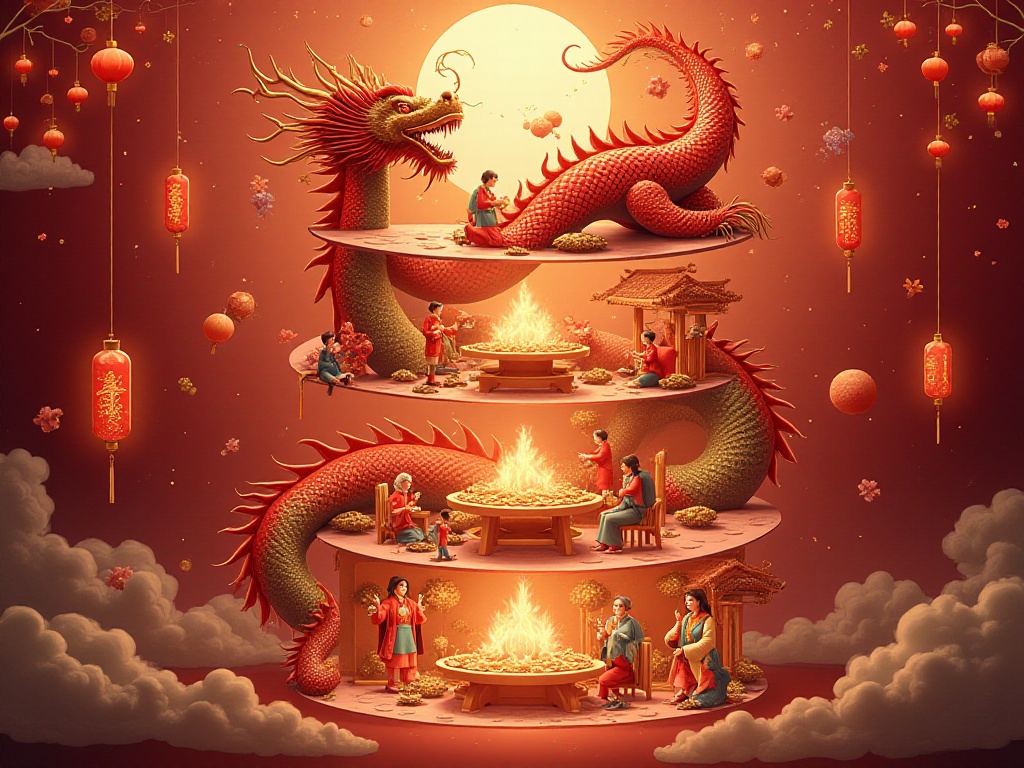
Changes in Festivals
Indeed, the way we celebrate festivals now is very different from before. Red envelopes have changed from paper to electronic, New Year's Eve dinner has moved from home to restaurants, and even New Year greetings can be done through video calls.
But thinking carefully, these changes are actually quite good. Electronic red envelopes might have less of the New Year feeling, but they're more convenient and environmentally friendly. Having New Year's Eve dinner at restaurants lets the whole family relax more and have more time to chat. Although video greetings are through screens, they allow those far from home to feel the warmth of family.
Most importantly, no matter how the form changes, that desire for reunion and cherishing family relationships remains constant. Just like our family this year - although we ordered New Year's Eve dinner at a restaurant, we still insisted on making dumplings at home. Because we all know making dumplings isn't just about eating, it's an important moment for family togetherness.
Seeking the Roots
Studying these traditional festivals carefully, you can really discover many interesting things. For example, Spring Festival has over three thousand years of history, dating back to the Shang Dynasty. Over these long years, many Spring Festival customs have continuously evolved, but their core meaning has never changed.
Have you noticed that many of our festival customs are related to "reunion"? Making dumplings emphasizes the whole family working together, eating rice balls emphasizes family gathering, and viewing the moon during Mid-Autumn Festival is about letting travelers worldwide see the same moon simultaneously. These traditional customs all convey Chinese people's value of family reunion.
Moreover, these traditional festivals all have deep cultural connotations. Spring Festival teaches us to respect the elderly and love the young, the Lantern Festival lets us experience liveliness and peace, and the Mid-Autumn Festival helps us understand the preciousness of missing and reuniting. These festivals are like cultural bonds, connecting thousands of years of Chinese civilization.

Final Words
This trip home for New Year gave me a completely new understanding of traditional festivals. These seemingly old customs actually carry deep cultural connotations and emotional attachments. In this fast-paced era, we should especially cherish these traditions because they're not just superficial rituals, but bonds maintaining our emotional connections.
Every place has its unique festival customs, and every family has its own way of celebrating. These differences precisely constitute the diversity and richness of Chinese traditional culture. Next time during festivals, why not calm down and experience the charm of traditional culture? You might make new discoveries too.
By the way, what special festival customs do you have in your area? I'd love to hear your stories!


